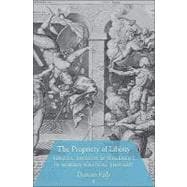
Note: Supplemental materials are not guaranteed with Rental or Used book purchases.
Purchase Benefits
What is included with this book?
| Acknowledgements | p. ix |
| Abbreviations | p. xiii |
| Introduction: The Propriety of Liberty | p. 1 |
| The Self at Liberty | p. 6 |
| Liberty and Political Theory | p. 9 |
| Structure | p. 12 |
| 'That glorious fabrick of liberty': John Locke, the Propriety of Liberty and the Quality of Responsible Agency | p. 20 |
| Propriety, Prudence and Interpretation | p. 21 |
| John Locke and Pierre Nicole: Language, Prudence and the Propriety of the Passions | p. 24 |
| Liberty and the Will | p. 41 |
| Persons, Passions and Judgement | p. 46 |
| Liberty and Personal Identity | p. 53 |
| Passionate Liberty and Commercial Selfhood: Montesquieu's Political Theory of Moderation | p. 59 |
| Justice | p. 61 |
| Lessons in Classics: Politics, Friendship and Despotism | p. 68 |
| The Passions of the Soul and the Actions of the Machine | p. 82 |
| Moderation and Soulcraft: The Action of PassionateSelfhood | p. 88 |
| Legislative Passions and Civil Religion | p. 94 |
| Commercial Society and Political Liberty | p. 105 |
| 'The True Propriety of Language': Persuasive Mediocrity, Imaginative Delusion and Adam Smith's Political Theory | p. 117 |
| Persuasive Agency | p. 119 |
| Sympathy and Propriety | p. 128 |
| A Passion for Justice: Smith's Political Theory | p. 141 |
| The Origins of Government and the Paradoxes of Political Liberty | p. 159 |
| Conclusions | p. 167 |
| Taking Things as They Are: John Stuart Mill on the Judgement of Character and the Cultivation of Civilization | p. 173 |
| Liberty by Example | p. 175 |
| Greek Legacies | p. 186 |
| Civilization, Civility, Cooperation | p. 194 |
| Excursus: Republicanism, Radicalism and Representation | p. 204 |
| The Politics of Civilization | p. 210 |
| Propriety in Time | p. 218 |
| Idealism and the Historical Judgement of Freedom: T. H. Green and the Legacy of the English Revolution | p. 223 |
| Character and Action | p. 226 |
| Reformation and Revolution | p. 234 |
| Enthusiasm and Reform | p. 241 |
| Real freedom | p. 244 |
| Political Theology | p. 249 |
| The Revolutionary Inheritance | p. 255 |
| Coda: Liberty as Propriety | p. 259 |
| Problems of Self-Ownership | p. 261 |
| Responsible Agency | p. 269 |
| State Propriety | p. 273 |
| Bibliography | p. 277 |
| Index | p. 341 |
| Table of Contents provided by Ingram. All Rights Reserved. |
The New copy of this book will include any supplemental materials advertised. Please check the title of the book to determine if it should include any access cards, study guides, lab manuals, CDs, etc.
The Used, Rental and eBook copies of this book are not guaranteed to include any supplemental materials. Typically, only the book itself is included. This is true even if the title states it includes any access cards, study guides, lab manuals, CDs, etc.